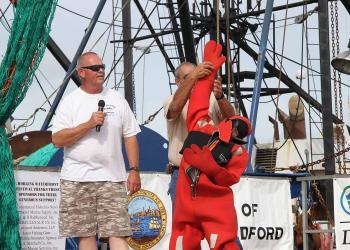Ted Williams

The Working Waterfront Festival Community Documentation Project
This project documents the history and culture of the commercial fishing industry and other port trades. The project began in 2004 in conjunction with the Working Waterfront Festival, an annual, educational celebration of commercial fishing culture which takes place in New Bedford, MA. Interviewees have included a wide range of individuals connected to the commercial fishing industry and/or other aspects of the port through work or familial ties. While the majority of interviewees are from the port of New Bedford, the project has also documented numerous individuals from other ports around the country. Folklorist and Festival Director Laura Orleans and Community Scholar and Associate Director Kirsten Bendiksen are project leaders. The original recordings reside at the National Council for the Traditional Arts in Maryland with listening copies housed at the Festival's New Bedford office.
Ted Williams is a seasoned professional with a rich history in the New Bedford fishing industry. Born and raised in Jacksonville, Florida, Williams moved to New Bedford, Massachusetts at the age of eighteen to pursue a career in agriculture. After working in the farming industry, he transitioned to marine construction, carpentry, and various other jobs before finding his calling in the fishing industry. Williams' extensive experience in the fishing industry includes roles as a fisherman, lumper, stevedore, fish cutter, tug boat captain, and merchant mariner. He also owned a small Eastern Rig boat, which he used for power dredging quahogs and scalloping [1]. After a serious injury, Williams worked on ferries in New York and for the Steamship Authority in New Bedford. Today, he serves as a safety trainer, sharing his wealth of knowledge and experience with others in the industry.
Scope and Content Note
This interview with Ted Williams, conducted by Madeleine Hall-Arber on September 28, 2013, provides a comprehensive look into Williams' life and career in the New Bedford fishing industry. Williams discusses his early life in Jacksonville, Florida, his move to New Bedford, Massachusetts, and his initial career in agriculture before transitioning to the fishing industry. Williams shares his experiences working in various roles on the waterfront, including as a fisherman, lumper, stevedore, fish cutter, tug boat captain, and merchant mariner. He also talks about his time as a boat owner, detailing his work with power dredging quahogs and scalloping. Williams recounts a serious injury he sustained while working for a tug boat company and his subsequent recovery and return to physical labor. The interview also touches on the social and cultural aspects of fishing life, including the role of immigrants on the waterfront and the parallels between family farms and family-owned fishing boats. Williams' current role as a safety trainer is also discussed, highlighting his continued involvement in the industry.
Please Note: The oral histories in this collection are protected by copyright and have been created for educational, research and personal use as described by the Fair Use Doctrine in the U.S. Copyright law. Please reach out Voices@noaa.gov to let us know how these interviews are being used in your research, project, exhibit, etc. The Voices staff can help provide other useful resources related to your inquiry.
The NOAA mission is to understand and predict changes in climate, weather, oceans, and coasts, to share that knowledge and information with others, and to conserve and manage coastal and marine ecosystems and resources. The Voices Oral History Archives offers public access to a wide range of accounts, including historical materials that are products of their particular times, and may contain offensive language or negative stereotypes.
Voices Oral History Archives does not verify the accuracy of materials submitted to us. The opinions expressed in the interviews are those of the interviewee only. The interviews here have been made available to the public only after the interviewer has confirmed that they have obtained consent.
